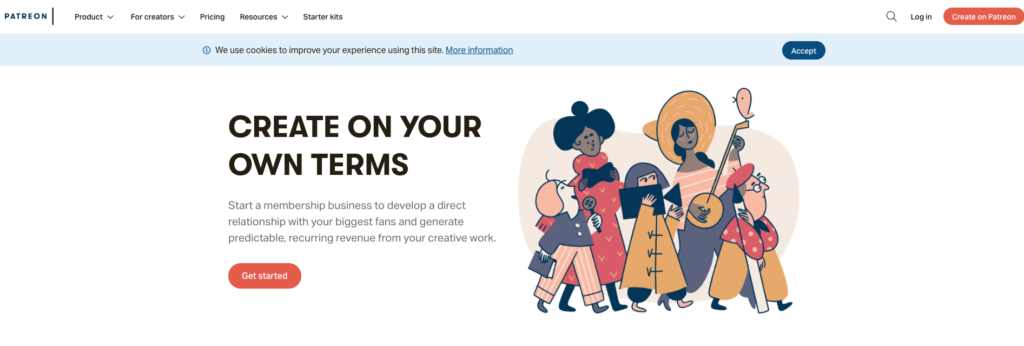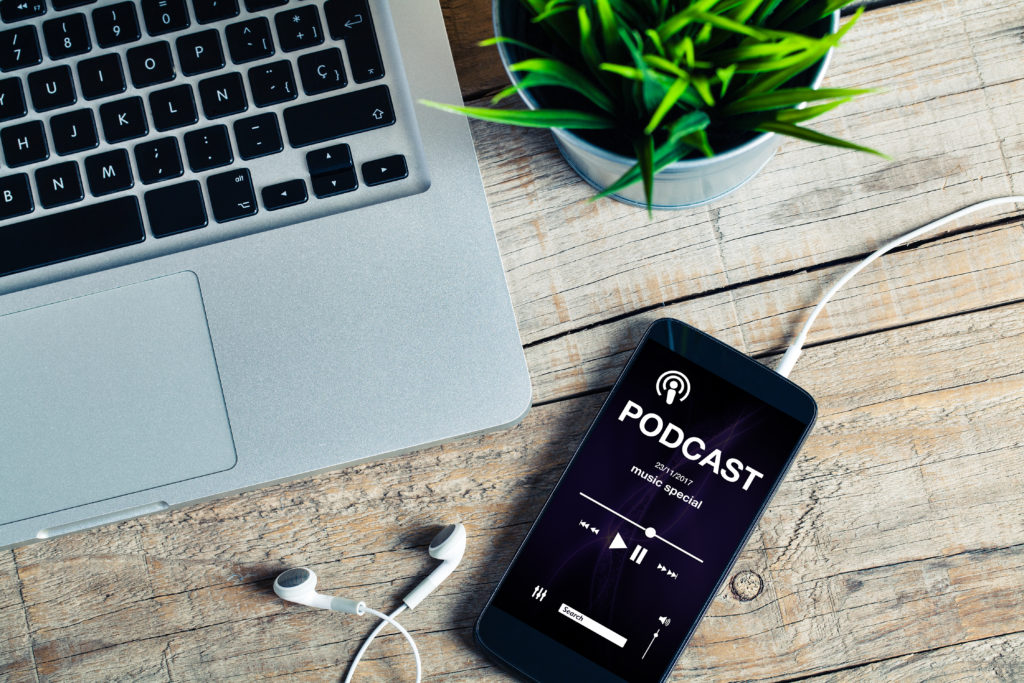Creating a podcast is a lot of fun, but it sure entails a mountain of work. But you can reward all your efforts once you figure out how you can earn money from your podcast.
Established podcasters make a lot of money. In fact, revenue from podcasts is expected to hit $659 million this 2020—more than double the income they generated in 2017.
You can utilize two ways to earn money from your podcast:
- Direct selling, wherein you’re selling the podcast itself
- Indirect selling, which means you’re using your podcast to sell other stuff
So, whether you’re already an established podcaster or just getting started with your new hobby, check out the following ways to monetize your podcast and make a sustainable living out of it:
Table of Contents
Ask for donations
If you’re not too particular on how much you want to earn, then you can simply ask for a donation from your listeners to sustain your podcast. Many fans are more than willing to sponsor their favorite podcast if you continue to create great content.
Here are a few suggestions on how to receive donations for your podcast:
- Set up a Patreon account—a payment platform for artists and other creatives. You can either stick with the default settings or create a system of rewards for donors depending on how much they contribute. Patreon allows you to give your donors perks for donating, making your donors feel comfortable spending money for your podcast.
- Add a PayPal button on your site.
- Open a Stripe account and add a donation form to your podcast website.

Secure sponsors
If you’ve heard podcasts that start with, “This episode is brought to you by (company name),” then that’s an example of a podcast monetized through sponsorships.
Sponsors pay you depending on how many listeners you have. As more and more people listen to your podcast, your revenue will also increase. You can mention your sponsors pre-roll and mid-roll, with the latter paying more.
You may also use dynamin ad-insertion (DAI) platforms to dynamically insert ads anywhere in your podcast without having to record and edit it into the actual audio file. You can even swap the advertisement for another sponsor once you reach your first sponsor’s quota.
But since sponsorships depend on the number of listeners, this podcast monetization trick may not be the best choice if you don’t have a lot of listeners.
Are you thinking of getting sponsors for your podcast? Reach out to companies directly to set up sponsorship deals. Another way is to use a broker—like Adopter Media, Midroll, and True Native Media—to make sponsor-searching easier.
Take note that they’ll take a 10% to 30% cut at your earnings, but it’s a small price to pay for the time you’ll save looking for sponsors.
Repurpose your content for profit
Creating new content takes time. But having a podcast opens new opportunities to develop spin-off content that takes less time to create, plus potentially gives you a profit. It also gives you a chance to reach out to a broader audience.
Here are ways to repurpose your podcast:
- Transcribe your podcasts
- Turn your podcasts into articles and compile them in an e-book.
- Record a video of your podcast and post them on YouTube, where you can enable monetization through YouTube ads

Encourage listeners to purchase premium episodes
If you already have a loyal following, there’s a good chance that some of them might be interested in exclusive recordings and never-before-heard content from you. Selling these premium episodes is a great way to monetize your podcast. You can even format it into a monthly subscription.
Examples of episodes you can sell are:
- Early access episodes
- Ad-free episodes
- Q&As with special guests
- Livestreamed episodes
- Video versions of regular podcast episodes
- Old episodes
- Bonus recordings
- Episode series with only the first one being free
But before doing this, make sure that the free podcast you’re offering already has a lot of value. People will get turned off if they suspect that you’re hiding all the good bits in the paid episodes.
On the other hand, giving them a ton of value with your free stuff will make them trust you and buy your paid subscription.
Sell downloadable resources connected to your podcast episodes
If you don’t have the resources to create a premium episode, you can still upsell your listeners by selling them something that’s connected to your episode.
For example, if you have an episode about creating eco-bricks, you can sell a downloadable step-by-step PDF guide on how to create them at home.
To make it easier for your listeners to download your upgraded content, place a payment form on the page where you publish your podcast download link. You may also add an e-commerce shopping cart to your site so that people can purchase several content upgrades at once.
Sell items and services through your podcast
If you’re selling products or services, you can use your podcast as a free tool for promotion.
You can give your listeners the link to your online store, or you can encourage them to book a consultation call with you.
For instance, if you’re a copywriter, you can critique various copy pieces on your podcast, providing your listener a value-filled, educational experience. You may promote your copywriting services on your podcast to monetize it.

Promote affiliate offers
Earning through affiliate marketing means getting a commission every time you refer a particular product or service to other people. Once your referral signs up, you automatically receive something like a referral for that.
Your podcast can help you promote your affiliate products and services. Just make sure that they’re related to what your podcast is all about. Check out Amazon and ShareASale for affiliate programs that you can join.
To earn money from your affiliate offer through podcasting, you can casually mention your affiliate offer during your podcast. Or, if you don’t have the audience size to attract traditional sponsorships, why not make your own ad spot for your affiliate offer?
Use a plugin like Lasso to create short links that redirect to your affiliate link. This makes it easier for you to share a quick and memorable URL to your podcast listeners.
Create an online course
You can create your online course that teaches similar content to what you talk about in the podcast.
For instance, if your podcast is all about coffee, you can create an online barista training course for those who want to take their love for coffee up a notch. When you sell that online course in your podcast, chances are people will sign up because both your podcast and class have the same target audience—coffee lovers.
To take things a step further, you can pair your course with a membership site, like a Facebook group, where your students can interact and learn from one another.
Check out some of the places where you can sell your online course:
- Coursera
- Udemy
- Skillshare
- Your website using a tool like MemberPress
Engage in public speaking events
It’s normal for podcasters to be invited in public speaking gigs and get paid for their time and expertise. Speaking fees can range anywhere from free amenities to six figures for the most experienced and influential speakers.
Aside from monetizing your public speaking gig, it also allows you to build your reputation and skyrocket your credibility as you speak in front of a large crowd. It also exposes your work to a new audience who will hopefully start listening to your podcast.
If public speaking is the path you want to follow, you don’t have to wait for someone to invite you. Here are three steps on how to start your public speaking career:
- Find and join local groups within your industry.
- Contact them to present a topic you want to talk about but be open to their ideas as well. Don’t forget to disclose to them that you’re planning to plug your podcast.
- Prepare a presentation for your audience. Make sure to include visuals.
Sell slots for your mastermind group
If you want to build a tribe using your podcast, you can create a mastermind group and sell slots for it.
A mastermind group is a small group of people who help each other out to achieve your shared goals. They help you stay on track with whatever you’re trying to accomplish through education, brainstorming, and accountability.
Since you have to limit the membership to your mastermind group so that you can all focus on one another, you can charge for its exclusivity. Just make sure that when you choose masterminds as your podcast monetization technique, you’ll truly commit to it because members expect a lot of value from it.
To form a mastermind group, you simply need to create a Facebook group or a Slack group where you’ll regularly update one another. If possible, you can also do meetups.

Host events
Already have a huge following? You can host a live event and sell tickets through your podcast.
Depending on your topic and audience, you can give a lecture, run a workshop, or teach a new skill during your event. But take note that event planning can be challenging to arrange and have high overhead costs, so it’s advisable only to do it when you already have a sizeable and loyal following.
When charging for tickets, remember to charge during registration and not on the day itself. It ensures a significant turn out as people already spent the money on tickets.
Create an app
An app will surely be a hit among your listeners, as long as it provides a solution for their problems and challenges.
For example, if you’re running a productivity podcast, you can sell a scheduling app to help them manage their time. If you have a yoga podcast, a yoga-on-the-go app containing multiple yoga classes might sell like hotcakes for your audience.
You can monetize your podcast in so many ways. You can even combine them and experiment with various techniques to see which works well for your audience. The key is knowing your target market and customizing your monetization strategies based on their needs and wants.